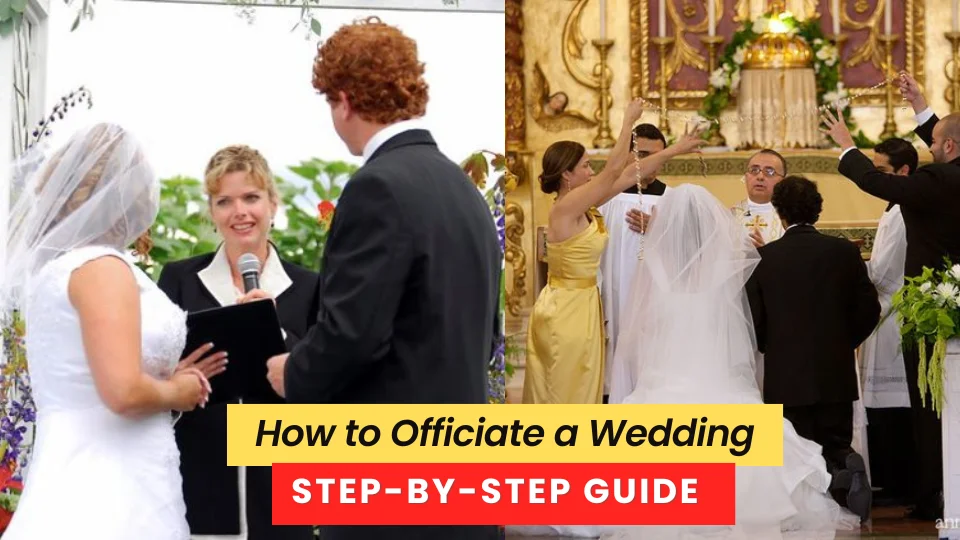How to Officiate a Wedding?

Officiating a wedding is a deeply meaningful and rewarding experience. Whether you’re a professional officiant or a loved one entrusted with this important role, understanding the responsibilities and preparations involved is crucial. This guide will walk you through everything you need to know to officiate a wedding with confidence and grace.
What Does It Mean to Officiate a Wedding?
To officiate a wedding means to lead the ceremony, ensuring the couple’s union is legally and ceremonially recognized. As an officiant, you are responsible for setting the tone of the event, guiding the couple and guests through the ceremony, and signing the marriage license.
Step-by-Step Guide to Officiating a Wedding
1. Understand Legal Requirements

Check Local Laws
Marriage laws vary by state, province, and country. Research the specific legal requirements for officiants in the location where the wedding will take place. Some regions require officiants to be ordained, while others may allow temporary authorization.
Obtain Ordination (If Necessary)
If ordination is required, you can often obtain it through recognized religious organizations or non-denominational groups online. Popular options include:
- Universal Life Church
- American Marriage Ministries
Verify Your Credentials
Once ordained, ensure your credentials are valid in the location of the wedding. Some jurisdictions require additional registration or documentation.
2. Prepare for the Ceremony

Meet with the Couple
Understanding the couple’s vision for their wedding is essential. Discuss:
- The tone of the ceremony (formal, casual, humorous, or romantic)
- Specific rituals, readings, or traditions they want included
- Length and structure of the ceremony
Draft the Script
Create a detailed ceremony script. Common components include:
- Opening Words: Welcoming guests and setting the tone.
- Vows: Guiding the couple through their promises.
- Exchange of Rings: Facilitating the symbolic exchange.
- Pronouncement: Declaring the couple married.
3. Practice and Rehearse
Rehearse the Ceremony
Attend the wedding rehearsal to familiarize yourself with the venue, coordinate with the wedding planner, and practice the ceremony flow.
Prepare Your Delivery
Practice reading the script aloud to ensure smooth delivery. Pay attention to pacing, tone, and emphasis to create an engaging experience.
4. Perform the Ceremony

Arrive Early
On the wedding day, arrive at the venue early to set up, meet the couple, and address any last-minute adjustments.
Lead with Confidence
During the ceremony, maintain a calm and confident demeanor. Engage with the audience and focus on the couple to create a heartfelt atmosphere.
Sign the Marriage License
After the ceremony, ensure all required parties sign the marriage license. Submit it to the appropriate authorities as instructed.
Tips for a Memorable Ceremony
Personalize the Ceremony
Incorporate personal stories or meaningful details about the couple to make the ceremony unique and special.
Respect Cultural and Religious Traditions
If the couple includes specific traditions, take the time to understand their significance and incorporate them respectfully.
Stay Flexible
Weddings can be unpredictable. Be prepared to adapt to unexpected changes or challenges with grace.
FAQs About Officiating a Wedding
1. Do I need to be ordained to officiate a wedding?
In most cases, yes. Many jurisdictions require officiants to be ordained or authorized. However, requirements vary, so always check local laws.
2. How long does a wedding ceremony usually last?
A typical wedding ceremony lasts 20 to 30 minutes. The length can vary depending on the couple’s preferences and included rituals.
3. Can I officiate a wedding for a same-sex couple?
Yes, as long as same-sex marriage is legally recognized in the location of the wedding. Ensure you meet all legal requirements.
4. What should I wear as an officiant?
Dress appropriately for the wedding’s formality and theme. Consult the couple if you’re unsure about the dress code.
5. How do I handle nerves during the ceremony?
Practice the script multiple times and focus on the couple’s happiness. Remember, the guests are supportive and understanding.
Conclusion
Officiating a wedding is a significant responsibility, but with proper preparation and a heartfelt approach, you can create a memorable and meaningful experience for the couple and their guests. By understanding legal requirements, personalizing the ceremony, and leading with confidence, you can make their special day truly unforgettable.






